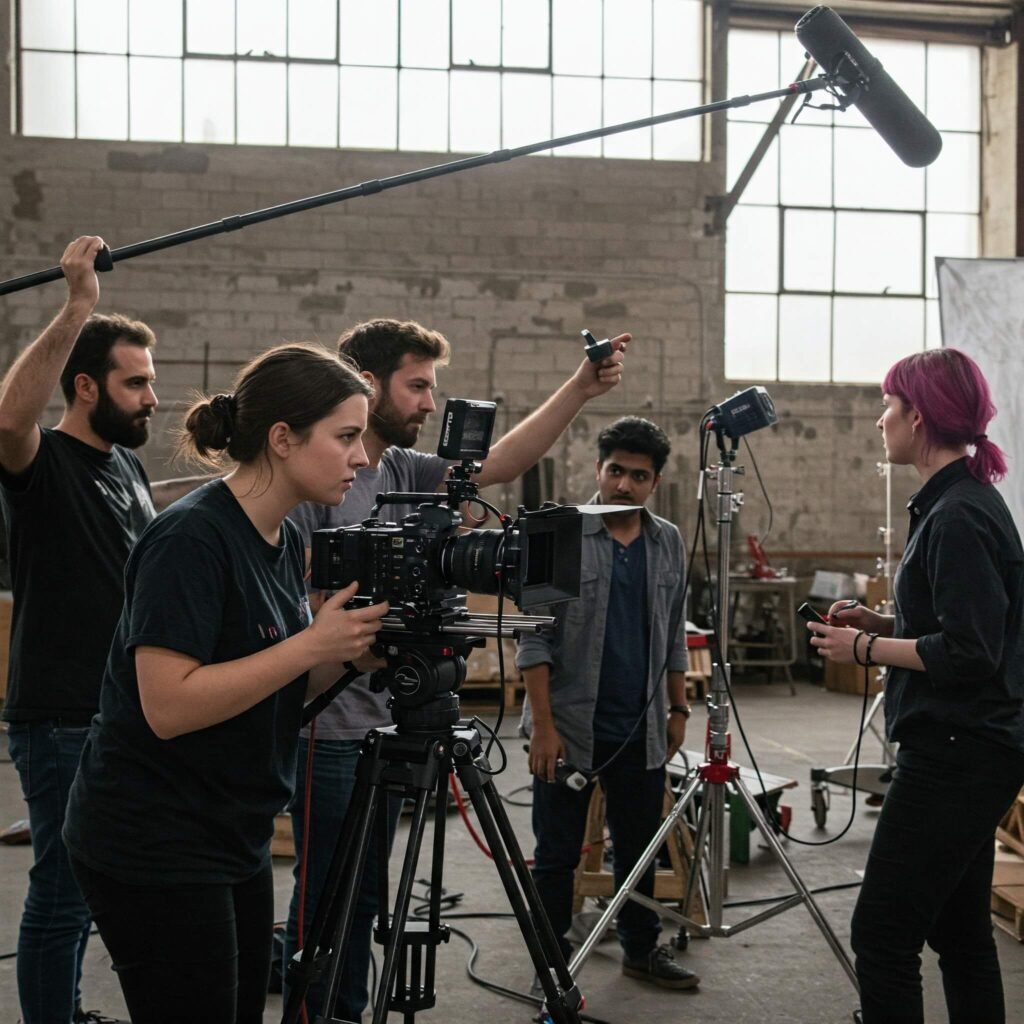Dreaming of seeing your name in movie credits or gracing the silver screen? You’re not alone. The allure of the film industry captures the imagination of millions. But how do you actually get from dreaming to doing? One of the most crucial steps is understanding and navigating the world of casting calls & how to break into the film industry.
This isn’t just about waiting to be “discovered.” It’s about preparation, persistence, and strategic action. In this guide, we’ll demystify casting calls, show you where to find them, how to prepare effectively, and explore other vital avenues for breaking into the film industry. Whether you’re an aspiring actor, a hopeful crew member, or simply curious, let’s dive in.
Understanding Casting Calls in the Film Industry
To successfully navigate the path of breaking into the film industry, you must first grasp the concept and process of casting calls. These are the gateways to opportunities.
What Exactly are Casting Calls?
At its core, a casting call is an announcement or invitation from casting directors, producers, or filmmakers seeking performers (actors, extras, dancers, etc.) or sometimes even specific crew members for a project. This could be for a feature film, short film, commercial, TV show, music video, or even a student project. Think of it as the film industry’s job interview process specifically for on-screen talent and sometimes specialized roles.
Different Types of Casting Calls
Not all casting calls are created equal. Understanding the variations is key to finding opportunities relevant to you when you’re trying to break into the film industry:
- Open Calls: These are auditions open to anyone who fits a general description, regardless of whether they have an agent. They can attract large numbers of people but offer a chance for newcomers to be seen.
- Invited Auditions: Most professional casting calls are by invitation only, usually extended to actors submitted by their agents or managers, or those who have previously impressed a casting director.
- Self-Tape Auditions: Increasingly common, particularly for initial rounds or when actors are in different locations. You receive sides (script excerpts) and record your audition from home, submitting it online.
- Callback Sessions: If you impress in your initial audition or self-tape, you’ll be invited back for a callback, often to read with other actors, the director, or producers.
- Casting Workshops: While not direct casting calls, reputable workshops can offer exposure to casting directors and a chance to learn their preferences and process. Be wary of workshops that charge exorbitant fees promising roles – legitimate ones focus on education.
Preparing Effectively for Casting Calls
Success in casting calls is less about luck and more about preparedness. Taking the right steps beforehand significantly increases your chances when aiming to break into the film industry.
Essential Materials for Casting Calls
Before you even look for casting calls, ensure you have your professional materials ready:
- Headshots: High-quality, professional photographs that look like you on a good day. Your headshot is your calling card.
- Acting Resume: Details your acting experience (film, TV, theatre), training (classes, workshops), special skills (languages, instruments, combat), and physical description.
- Demo Reel: A short video compilation showcasing your best on-screen work. Essential once you have some footage. If not, a well-done monologue or scene might suffice for some projects.
- Slate Shot: A brief video introducing yourself by name, sometimes stating your height and location. Often required for self-tapes.
Researching the Project and Role Before Casting Calls
Never go into a casting call blind. Research is vital for showing you understand the project and how you fit in:
- Understand the Project: Is it a drama, comedy, horror? Who is the director, producer, casting director? What other actors are involved? Knowing the tone and style helps you make appropriate choices. You can often find information on industry news sites like Variety or The Hollywood Reporter.
- Analyze the Character: What are their motivations, relationships, and emotional arc? How does this character serve the story? The more specific your understanding, the more compelling your audition will be.
- Read the Sides Thoroughly: Understand the context of the scene provided for your audition. Know the lines intimately.
Rehearsing and Self-Taping for Casting Calls
Practice makes perfect, especially for casting calls.
- Rehearse Your Sides: Work on your lines and character choices. Run the scene multiple times, exploring different nuances.
- Practice Self-Taping: Set up a simple, well-lit space with a neutral background. Use decent audio and video quality. Practice framing and performance specifically for the camera. Many casting calls now start with a self-tape.

Finding and Attending Casting Calls
Knowing where to look is the next piece of the puzzle for breaking into the film industry via casting calls.
Online Casting Platforms: A Major Source of Casting Calls
Several reputable websites list casting calls. Many require subscriptions but are essential tools:
- Actors Access
- Casting Networks
- Backstage
- Explore sites specific to your region or type of work (e.g., Playbill for theatre opportunities).
Agents and Managers: Gatekeepers to Professional Casting Calls
For access to higher-level, professional casting calls, particularly in film and television, you often need representation. Agents submit you for roles they think you’re right for and negotiate contracts. Getting an agent is a significant step in breaking into the film industry. You can find information about reputable agents through industry unions like SAG-AFTRA (for the US).
Networking and Industry Events Lead to Casting Calls
Building relationships is key. Attend film festivals, industry mixers, workshops, and screenings. You never know who you’ll meet – directors, writers, producers, or casting associates who might think of you for future casting calls. Look for local film community groups or film commission websites for events.
What to Expect When Attending a Casting Call
The actual audition process can vary, but here’s a general idea:
- Waiting Area: You’ll likely wait with many other actors. Be professional and courteous.
- The Audition Room: You’ll go into a room, often with the casting director (CD) and perhaps their associate, a reader (who reads lines opposite you), and sometimes a camera operator.
- Slating: You’ll introduce yourself on camera.
- Performing: You’ll perform the prepared sides. The CD might give you adjustments (“notes”) and ask you to do it again.
- Questions: They might ask a few questions about your experience or availability.
- Thank You: Thank them for their time and leave. It’s usually brief!

Beyond Casting Call: Other Ways to Break In
While casting calls are central for actors, breaking into the film industry isn’t only about auditioning.
Starting with Independent and Short Films
Many successful actors and filmmakers got their start on low-budget independent features or short films. These projects are invaluable for gaining experience, getting footage for your reel, and making connections within the industry. Look for these opportunities on local film groups, student film message boards, or general casting sites often list non-union or low-pay/no-pay indie gigs. This experience can lead to getting noticed for bigger casting calls.
Taking Acting Classes and Workshops
Continuous training is vital. Classes help hone your craft, keep your skills sharp, and connect you with coaches and fellow actors. Workshops, as mentioned, can offer exposure to industry professionals and insights into the casting calls process. Research reputable acting schools and coaches in your area.
Gaining Experience Behind the Camera
Understanding the filmmaking process from other perspectives can be incredibly beneficial. Working as a production assistant (PA), grip, or in other crew roles provides insight into how sets operate and allows you to build relationships with directors, producers, and yes, casting directors and actors. This indirect path can sometimes lead to on-screen opportunities or a better understanding of what happens after the casting call. You can find information on crew jobs through production listing sites or local film commissions.

Maintaining Momentum on Your Journey
Breaking into the film industry is a marathon, not a sprint. You’ll face rejection, periods without casting calls, and moments of doubt.
- Persistence: Don’t give up after a few rejections. Every audition is practice.
- Networking: Keep building and nurturing relationships. The film industry thrives on connections.
- Self-Care: It’s a demanding path. Maintain your physical and mental well-being.
- Keep Learning: Watch films, read scripts, take classes. Stay passionate and informed.
Conclusion
The world of casting calls & how to break into the film industry can seem daunting, but with the right preparation, resources, and mindset, it’s an achievable goal. Understand the different types of casting calls, meticulously prepare your materials and your audition, actively seek opportunities through online platforms and networking, and remember that there are multiple paths to finding your place in this exciting industry. Stay dedicated, keep honing your craft, and pursue those casting calls with confidence! Good luck!




